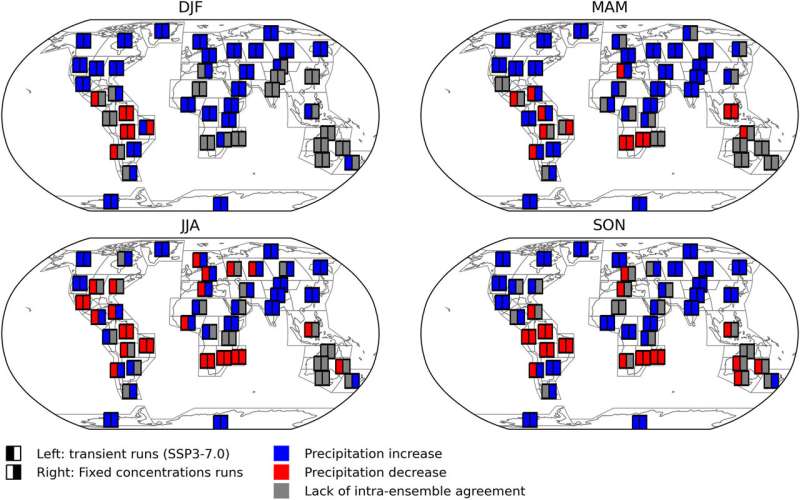This article has been reviewed according to Science X's editorial process and policies. Editors have highlighted the following attributes while ensuring the content's credibility:
fact-checked
peer-reviewed publication
trusted source
proofread
Droughts in Europe could be avoided with faster emissions cuts

Rapid climate action could mean devastating dry periods in the Mediterranean become less frequent by the end of the century, a new study shows.
Advanced computer modeling suggests summer rainfall in southern Europe could decline by up to 48% by the year 2100 if emissions of greenhouse gases continue to rise rapidly, but much of this projected decline could be avoided by reaching net-zero emissions as soon as possible.
The study, led by scientists at the University of Reading, published in Geophysical Research Letters, provides additional evidence to motivate accelerated climate action and prevent drastic rainfall decline, more droughts and more forest fires.
Dr. Andrea Dittus, the study's lead author, said, "The climate has already warmed so much that some rainfall decline is inevitable, but our findings show that further summer drying projected for Europe could be avoided. Halting rising global temperatures by reducing fossil fuel emissions to net-zero will mean the Mediterranean does not continue to get drier."
"We have no time to waste in cutting emissions. If we don't act rapidly, many countries in the Mediterranean will suffer from a significant lack of rain, with potential major knock-on effects for the UK and elsewhere."
Slowing global warming
Many previous studies have investigated the impact on Earth at different levels of global warming, but studying net zero climates is a relatively recent focus of research that follows commitments by world leaders—such as in the 2015 Paris Agreement—to limit global warming.
The new study focuses specifically on the impact of stabilizing temperatures in Europe. The researchers highlight that the speed of global warming is a critical factor in preventing drought and extreme dry periods. When temperatures rise quickly due to unchecked emissions, it causes more extreme shifts in rainfall. But if warming happens more gradually because of strong climate action, the impacts are less severe.
This means that the steps taken by countries to cut pollution in the coming years could hugely influence Europe's future summers. While focused on Europe, the scientists say similar benefits of rapid climate action are likely for other regions across the world.
However, the researchers caution that avoiding the most serious impacts depends on achieving major emissions reductions starting right away. The more optimistic scenarios are only possible if the world transitions away from fossil fuels as soon as possible.
More information: A. J. Dittus et al, Reversal of Projected European Summer Precipitation Decline in a Stabilizing Climate, Geophysical Research Letters (2024). DOI: 10.1029/2023GL107448
Journal information: Geophysical Research Letters
Provided by University of Reading




















